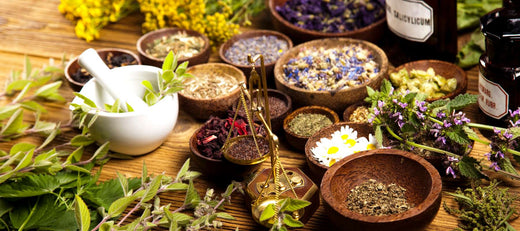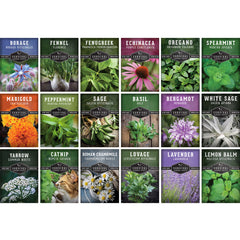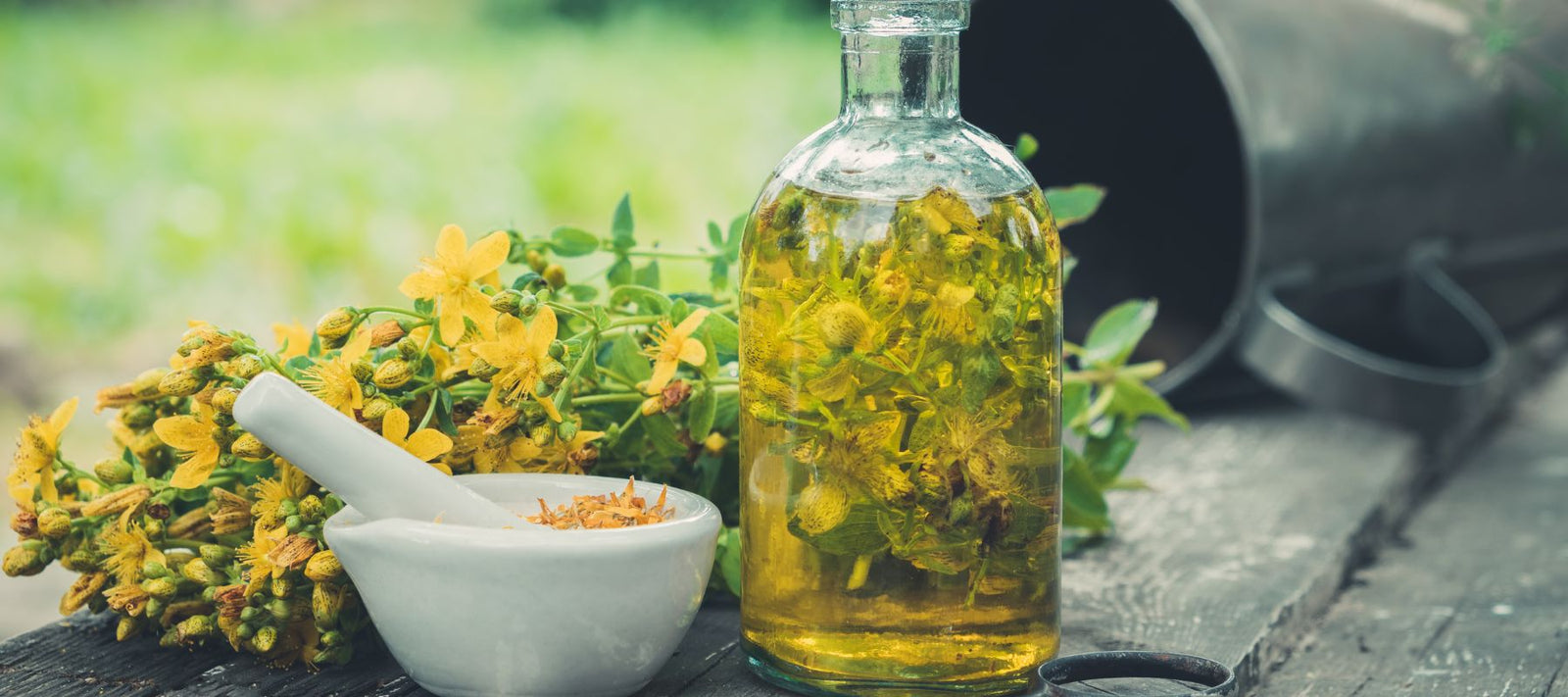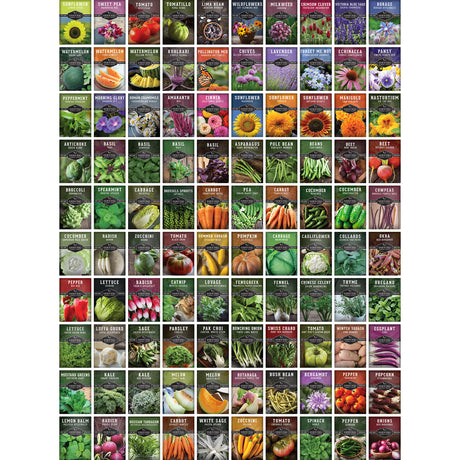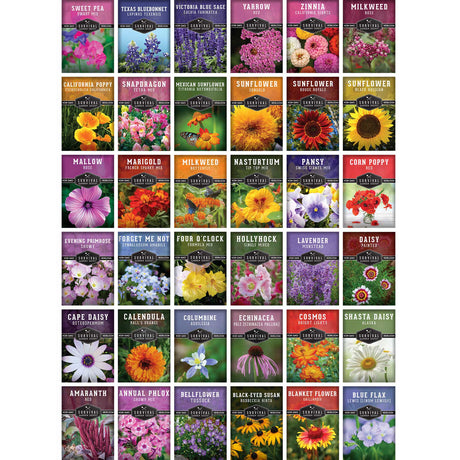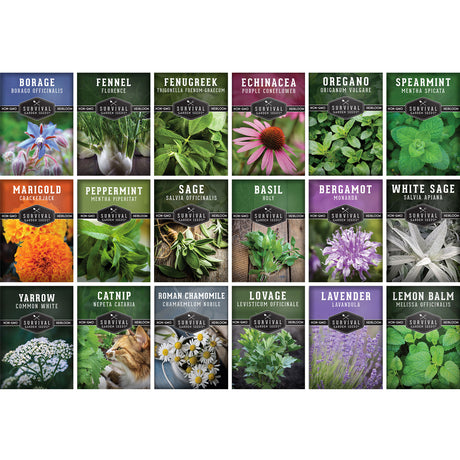Whether you’re a seasoned herbalist or a relative newbie to medicinal herb gardening, you’ve probably heard of St John’s Wort. Also known as Common or Perforate St John’s Wort, SJW, John’s Wort, or Klamath Weed, and its botanical name, Hypericum perforatum, this herb has a long history of traditional use. Today, it has been subjected to rigorous scientific scrutiny and has earned its place in the healing garden, particularly for its support of mental health.
St John’s Wort: Medieval Times to Modern Day
St John’s Wort’s common and botanical names are rooted in its rich history. Its sunny yellow flowers bloom right in time for the Midsummer Festival on June 24, which became the feast of Saint John the Baptist when Christianity moved into medieval Europe. The blooms were believed to call upon the power of the sun and St John the Baptist. They were (rightly) believed to be especially potent when harvested around the solstice. After they were harvested, the flowers were worn on clothing and hung over door frames and religious icons to ward off evil spirits. This practice isn’t commonplace anymore as we’ve traded in our fear of evil spirits for a more scientific understanding, but it still lives on in the botanical name hypericum, from the Greek for “above” and “icon.”
The belief that St John’s Wort could chase away demons does hold a grain of truth. It does have a powerful effectiveness at “keeping the demons at bay” by alleviating symptoms of mild to moderate depression and anxiety. The above-ground parts of this powerful plant have been proven useful in supporting mental health in other ways, such as addressing symptoms of menopause, sleep disorders, seasonal affective disorder, and anxiety. Today, St John’s Wort is used worldwide in tinctures, herbal teas, and supplements. It is also a key ingredient in herbal healing salves for wound care and skin health. In the garden, the vibrant yellow flowers add some color and attract pollinators like bees and butterflies, making it doubly useful as an ornamental plant.
Growing St John’s Wort from Seed

Patience is key when growing St John’s Wort from seed, as germination can take 14-21 days in optimal conditions. Direct sow seeds in fall or early spring or start indoors 6-8 weeks before the last frost. If you start seeds indoors, 4-6 weeks of cold stratification can speed germination by recreating winter conditions that “wake up” the seeds from their dormancy. Barely cover seeds when planting as light is needed for germination. When it’s time to transplant, space the seedlings about a foot and a half to two feet apart to allow plenty of room for the plant to bush out.
St John’s Wort is an easy plant that doesn’t require a lot of extra care. It prefers full sun but can tolerate partial shade, especially in hotter climates. It thrives in well-drained soils, so avoid planting it in unamended heavy clay. Once established, it’s fairly drought-tolerant and pest-resistant. This is a good plant to grow in a container or raised bed as it can become invasive if left unchecked. Regular pruning and deadheading of spent flowers before seeds form will also help control unwanted spread.
Harvesting St John’s Wort
Our medieval ancestors knew when to harvest St John’s Wort, as the herb is most potent when harvested at full bloom around midsummer. Follow their example when you harvest, using a pair of sharp gardening shears to snip off the flowering tops and a portion of the stems early in the morning. You can use these flowers and stems fresh in tea. Dry the excess for long-term storage. The flowers must be dried or processed quickly to preserve potency. Keep your dried herbs sealed in an airtight container in a dark, cool place.
Safely Using St John’s Wort

While St John’s Wort offers numerous benefits, take care when using it or any other medicinal herb. Always consult a healthcare professional to make sure it’s safe for you to use this plant. Although it’s a potent healing herb that has helped many people, St John’s Wort may interact negatively with various medications, including SSRIs, birth control pills, statins, antihistamines, and certain chemotherapy and immunosuppressant drugs. It also may increase sensitivity to sunburn, especially in fair-skinned individuals. It also may exacerbate manic episodes in those with bipolar disorder.
St John’s Wort is a renowned medicinal herb with a rich, vibrant history of uses. It has proven its value as a mental health support for those with mild to moderate depression and anxiety and as an anti-inflammatory supporting skin health. With its adaptable growth, beauty, and proven health benefits, St John’s Wort is a deeply rewarding and useful addition for your medicinal herb garden.



